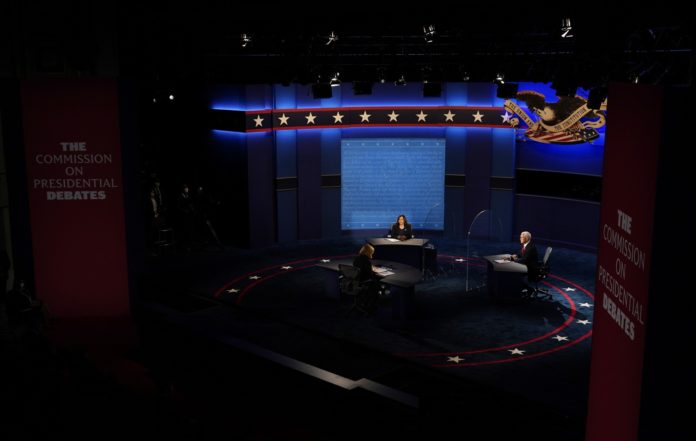
By Vivian Roach | Staff Writer
COVID-19 is at the forefront of the election again after President Donald Trump tested positive for coronavirus last week, a hot topic of the vice-presidential debate Wednesday night.
Vice presidential candidates Senator Kamala Harris and Vice President Mike Pence met in Salt Lake City for the debate. Quite literally putting the pandemic on the forefront, plexiglass shields were installed on the debate stage between the two candidates to mitigate the spread of COVID-19.
The debate opened on the topic of the coronavirus, questioning both candidates about their plans. The topic was later framed in the context of the U.S. economy.
Lakewood, Colo., senior Charlie Doebbler, public relations chair for Baylor College Republicans said there wasn’t much change in the rhetoric used on the topic.
“As far as both candidate’s coronavirus answers, they’re pretty much the same as they have been and will continue to be,” Doebbler said. “Mike Pence tried to put it behind him and move on from it, and Kamala Harris used what has happened as a result of the virus to try and gain leverage over the Republicans.”
Dr. Dwight Allman, political science professor, said he thinks the virus is very difficult territory for Trump and Pence. He said Pence’s approach to the question was strategic and might’ve worked better than answering the questions.
“I was interested to see the ways in which, in respect to the coronavirus situation, how Vice President Pence tried to play that. He tried to turn it into something of a referendum on the American people and pushed the charges against the administration into the background,” Allman said. “He made himself into a kind of defender of the efforts and the determination of the American people to combat the virus and overcome the pandemic, and in doing so he dodged the questions.”
San Antonio sophomore Alice Shelly, vice president of Baylor Democrats, said that both candidates took very different approaches to addressing COVID-19.
“Senator Harris addressed the 210,000 Americans that have died from COVID-19 and accused the vice president of covering up information about the virus in January. On the other hand, the vice president said that Trump’s administration was successful in minimizing the impact of COVID. His example of a public health failure was the swine flu in 2009,” Shelly said. “I thought that Senator Harris talked about COVID-19 in a rightfully serious manner because she laid out Biden’s plans to offer free vaccines to all Americans when available.”
Allman said Harris could’ve exploited the record of Trump’s administration on the pandemic more than she did.
“She at various points gestured, but I think she could have circled back on a number of occasions to underscore certain things, especially the death toll as a percentage of our population that came up at one point and how much higher that is than pretty much any other advanced nation in the world,” Allman said. “I think Canada was mentioned as one point of comparison, and we have about two and a half, three times as many deaths per 100,000 of our population than Canada does.”
Allman did say the vice presidential debate was a more cordial environment than the initial presidential one. He thought that while viewers may not have learned much new information, it was still progress in the format.
“It was much more of a serious exchange — a real debate — and an opportunity for both sides to ask questions to the other side in a way that can be informative for citizens,” Allman said. “But I don’t think that anything I heard tonight is able to change the dynamic of the race. I don’t think it will move the needle any. I do think it was in the norms of this kind of event. This practice has become an established practice of our democratic life, of electoral politics.”





